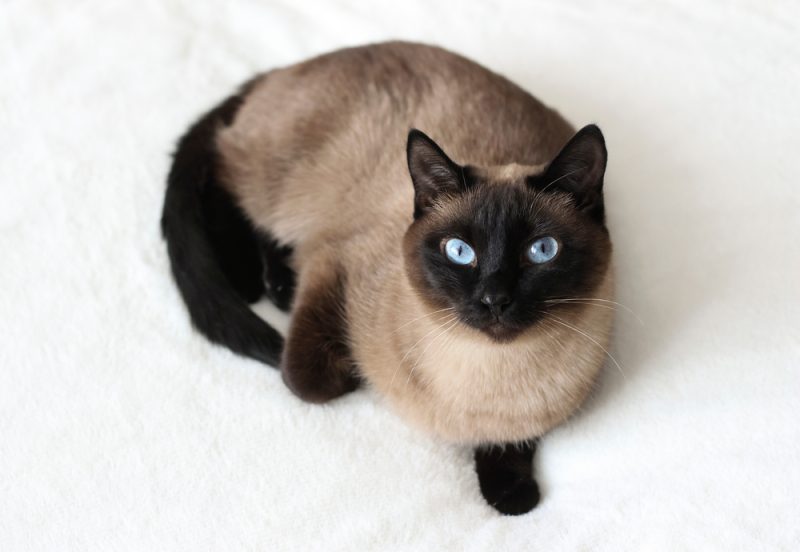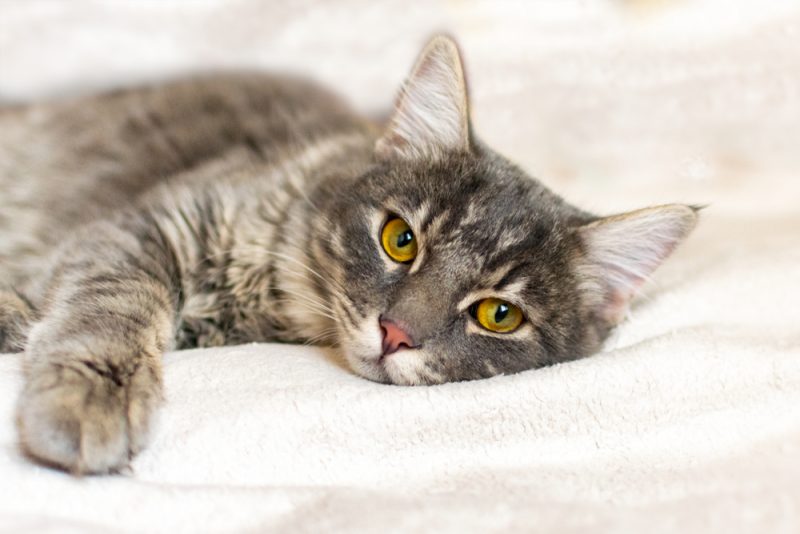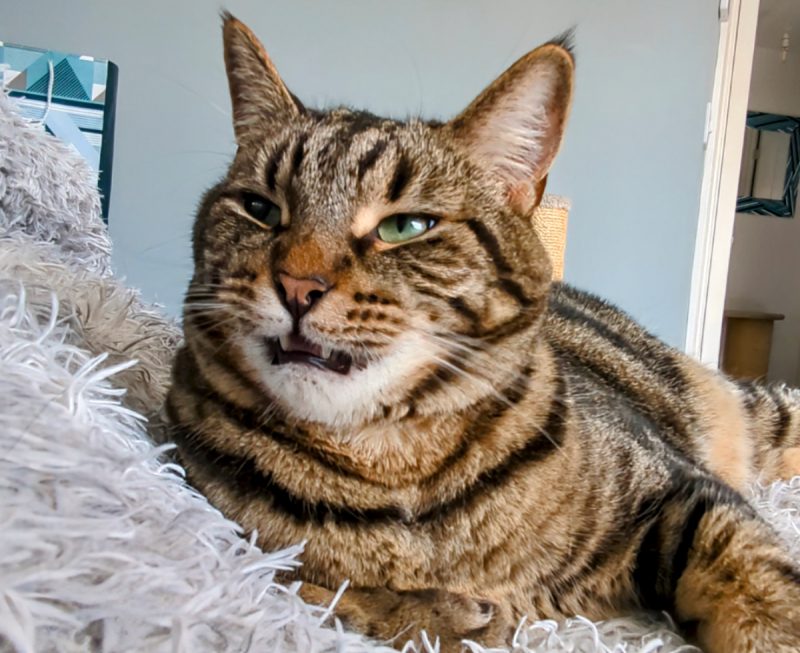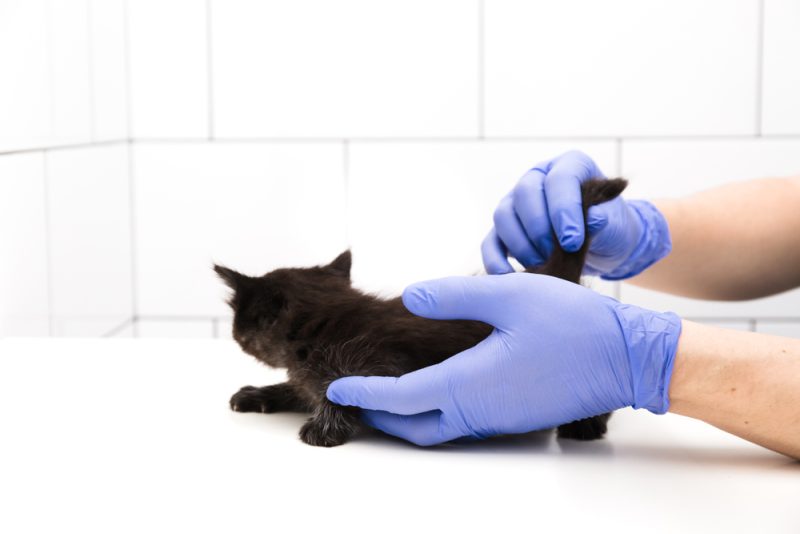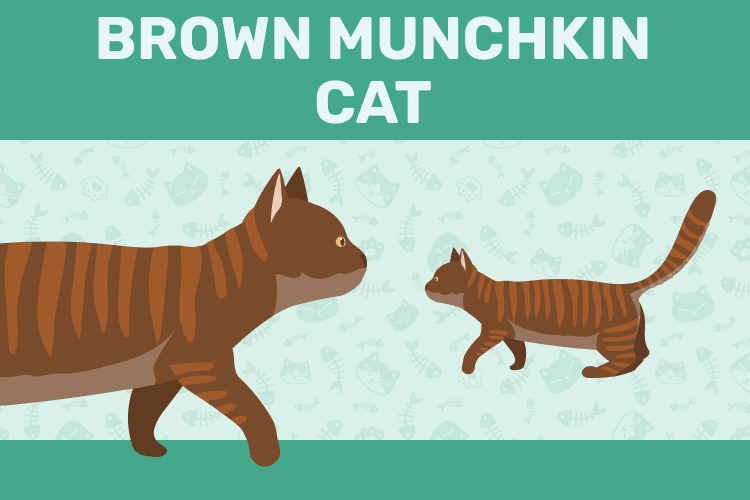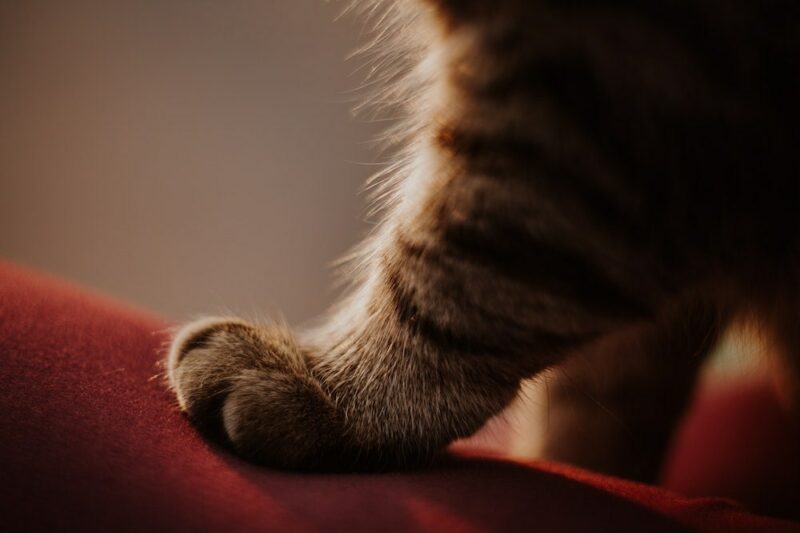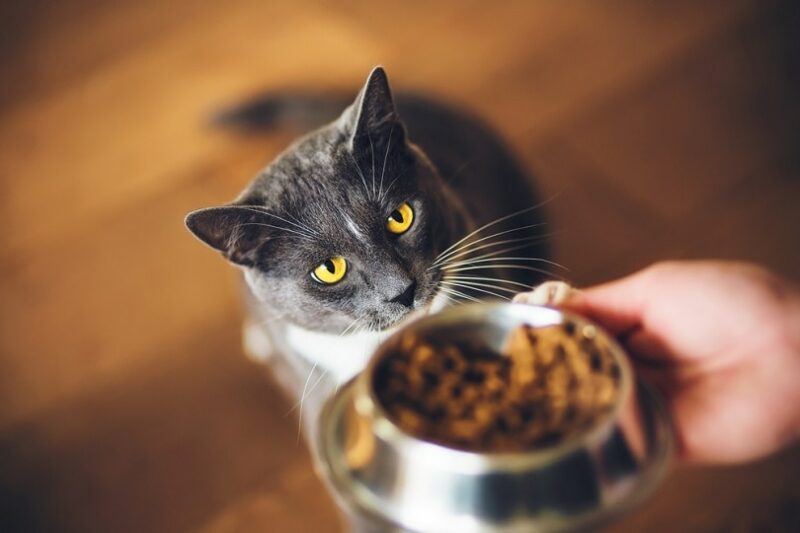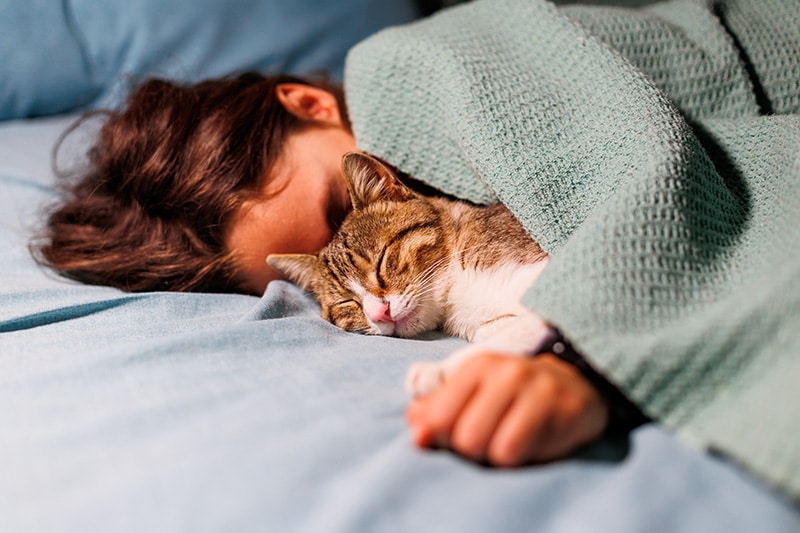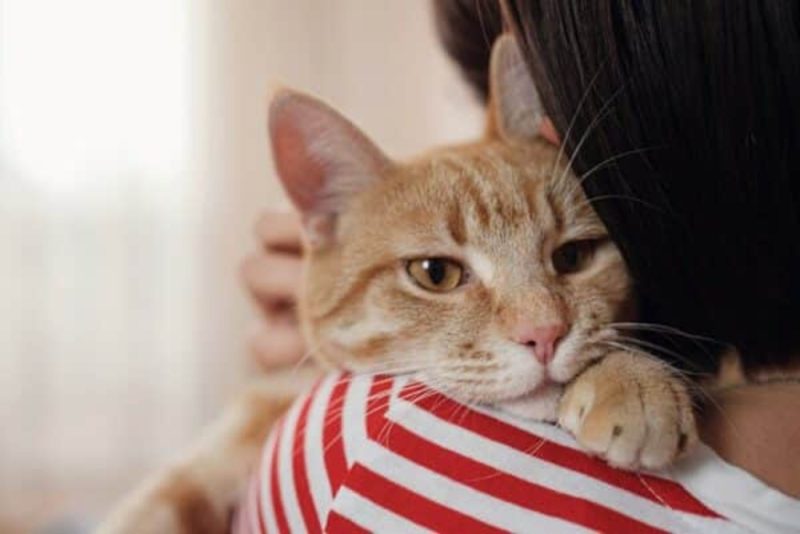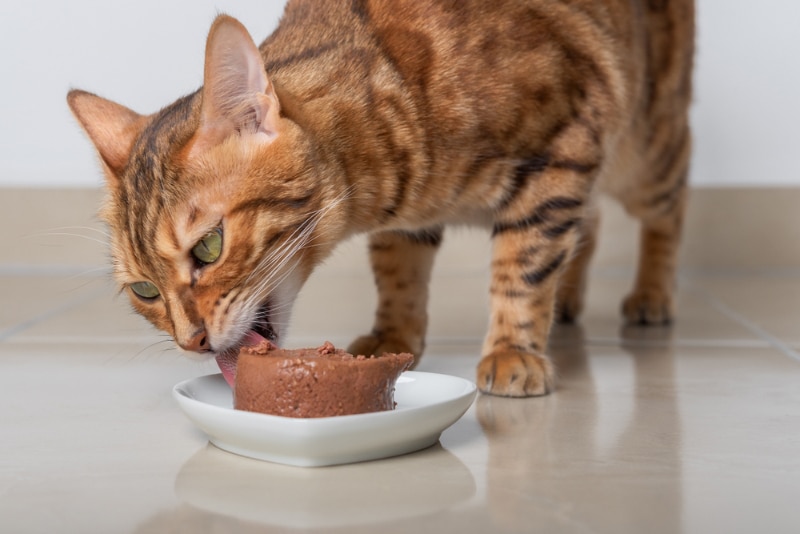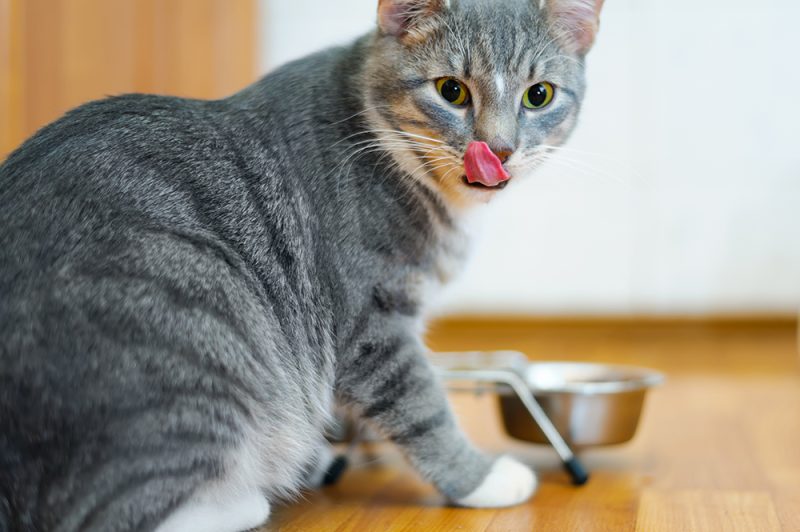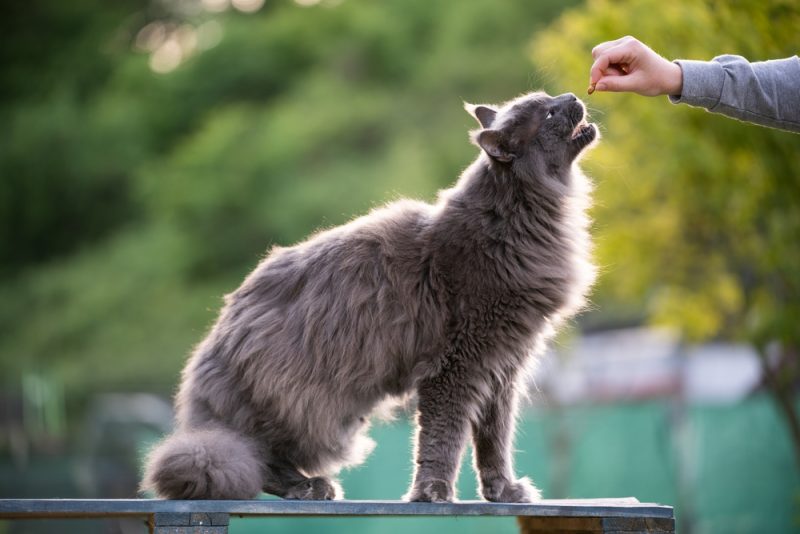All cats scratch themselves at one time or another throughout their lives, and scratching is a natural response to irritants. Scratching should not be a regular or consistent occurrence, but occasional scratching is typically nothing to worry about. Excessive scratching, referred to as feline pruritus, is not normal and should not be overlooked.
There are a few reasons that your cat might be scratching themselves excessively. We’ll discuss the reasons and whether there is anything that you can do to alleviate your cat’s scratching.

Common Causes of Why Cats Scratch So Much & How to Stop It
1. Flea Allergies
Many cats are allergic to flea saliva. When a flea bites them, and their skin and bloodstream are exposed to the flea’s saliva, their immune system overreacts. An overactive immune system can result in extensive and prolonged itching, licking, and scratching episodes. The scratching may be accompanied by other signs of flea allergies, such as skin rash, hair loss, scabs, sores, and raised bumps, often around the tail base, rump area, head, and neck.
Cats may lick so much that skin sores appear and hair falls out. Even cats not allergic to flea saliva will itch and scratch when infested with fleas, but their skin irritation won’t be as severe as in cats that are allergic.
- If you spot signs of flea allergies, you should be able to inspect your cat’s fur and skin and find at least a couple of fleas lurking about. You may get bitten and develop an itchy spot if you have a flea infestation. Often, you may find small black or brown tiny spots on your cat’s fur that resemble dirt but are flea poop, referred to as “flea dirt.”
- If that is the case, consulting your vet, who can treat your cat for fleas but also help reduce the skin irritation they are experiencing, is the best way to get rid of their allergy signs.
- You can use a flea comb to remove the adult fleas from the fur, but it’s essential to treat the cat and your home, too, due to the presence of flea eggs and larvae. Your veterinarian will also prescribe an appropriate monthly medication that will keep fleas from biting your cat for the long term.
If you need to speak with a vet but can't get to one, head over to PangoVet. It's an online service where you can talk to a vet online and get the advice you need for your pet — all at an affordable price!

2. Airborne Allergies or Atopy
Another reason your cat might be scratching frequently is airborne allergies or atopic dermatitis. Cats can be allergic to pollen, other environmental allergens, and dust mites. In humans, atopy is commonly described as hay fever and exhibits runny eyes and sneezing, but cats typically show their discomfort by scratching themselves, sometimes incessantly.
- The most effective way to deal with airborne allergies is to see a veterinarian and inquire about a dermatological workup. It may sound challenging, expensive, and time-consuming, but your vet needs to rule out the most common non-allergic skin diseases before performing allergy testing.
- The diagnosis is sometimes based on exclusion, and a referral to a dermatologist may be recommended. Your vet and dermatologist will speak to you about managing the signs after atopic dermatitis has been confirmed, and hyposensitization therapy, alongside immunosuppressants, is available if the allergens are confirmed.
- Your cat’s atopy can be managed with adequate therapy and regular checks. However, there can be flare-ups during pollen season, depending on the allergens they are sensitive to.
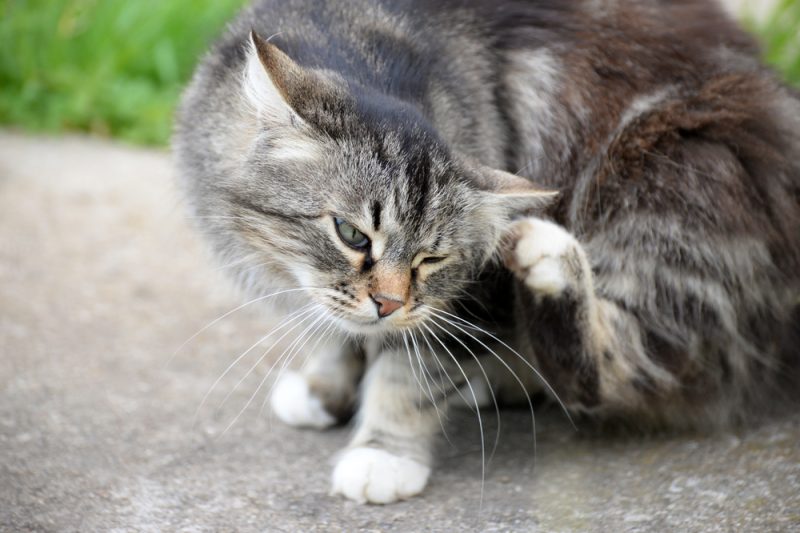
3. Food Allergies
Food allergies can affect cats, and excessive scratching is a prime sign. Some cats are allergic to beef, while others are allergic to pork or chicken. The proteins in cat foods can be responsible for cats’ allergy reactions.
The signs of food allergies in cats include chronic skin inflammation and scratching, digestive issues, flatulence, upper respiratory signs, sneezing, coughing, ocular and nasal discharge, and others. Often, cats will suffer from a combination of allergic skin diseases, such as atopy and a food allergy, making it more challenging to manage their signs.
- The food allergy signs in your cat will not go away on their own. The scratching, inflammation, and digestive or respiratory signs will stay active until the problem food is removed from your cat’s diet. Your veterinarian or a veterinary dermatologist can recommend food trials to try and identify the specific proteins your cat is allergic to so you know what to eliminate from their diet.
- They can help you create an elimination diet to determine which foods your cat should not eat. This process may be slow, and your cat should not eat anything besides their special diet. Otherwise, the trial won’t be accurate and must start again.
4. Scabies
Scabies is a skin disease brought on by parasites called Notoedres cati in cats, but it may also be affected by the canine scabies Sarcoptes scabiei. It is incredibly contagious, and if left untreated, it can result in the development of crusty lesions starting on the ears, head, and neck and spreading over the whole body, along with consistent scratching.
This disease will not go away on its own, and until it is eradicated, the lesions and scratching will not only stick around but also worsen. Luckily, it is quite rare.
- Your cat will need to see a veterinarian who can confirm the presence of the parasites and prescribe medication or topical solutions to kill the mites that are causing scabies. The process can take several days, if not a couple of weeks, to complete.
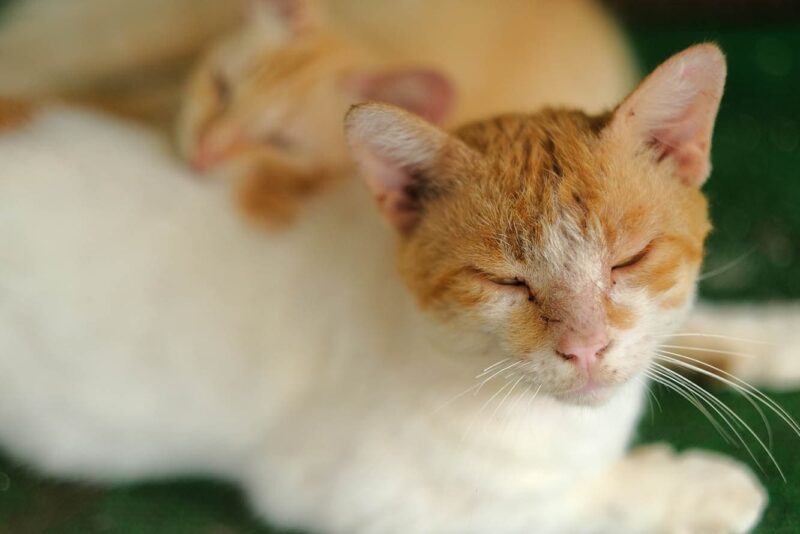
5. Other Mites
Ear and burrowing mites can cause scratching problems for your cat. Ear mites live inside the ear canal and can be highly irritating. The irritation drives cats to scratch their ears incessantly as time goes on. Burrowing mites eat the surface of a cat’s skin away, which causes irritation and scratching.
Both types of mites can be transferred to other animals and even humans, so your cat should be treated as soon as possible after the first sign of mites is noticed. Another species commonly seen in catteries and multi-cat households is Cheyletiella mites or walking dandruff. Scaling of the skin, crusts, and bumps are commonly present on the back of cats suffering from the mites. Some cats show no signs of infestation but transmit the mites to other pets and people.
- If you suspect your cat has a mite or any other skin parasite infestation or skin irritation, they must see a veterinarian as soon as possible. Skin issues can worsen quickly, and parasites can spread to pets and family members.
- Trying to treat them at home is a waste of time and money since the condition will worsen without adequate veterinary care. Skin problems in cats are painful and very irritating for your kitty, so don’t delay getting them the treatment they need.
6. Stress Overgrooming
Cats are affected by minor changes in their routines or environment, such as a new pet, the arrival of a baby, changes in their litter box location or litter material, noise, new furniture, and more. This can cause some cats to hide, stop eating, or lick and groom themselves excessively to comfort themselves. It can lead to skin sores and wounds, hair loss, and, in some cases, skin infections.
- Get your cat checked out by a vet to rule out underlying causes of overgrooming, such as allergies or parasitic skin disease, pain in a specific area, or other conditions. Your vet may recommend a treatment to prevent further self-trauma, such as using an Elizabethan collar, in some cases, alongside corticosteroids or antibiotics.
- Getting down to the root cause and identifying the stressor is crucial. Removing the cause of stress, using pheromone diffusers, and ensuring your cat has their privacy and a calm, quiet resting place, along with plenty of mental and physical stimulation and enrichment, are some of the ways to reduce their stress, anxiety, and frustration, and to stop this damaging behavior. A consultation with a feline behaviorist may also be required.
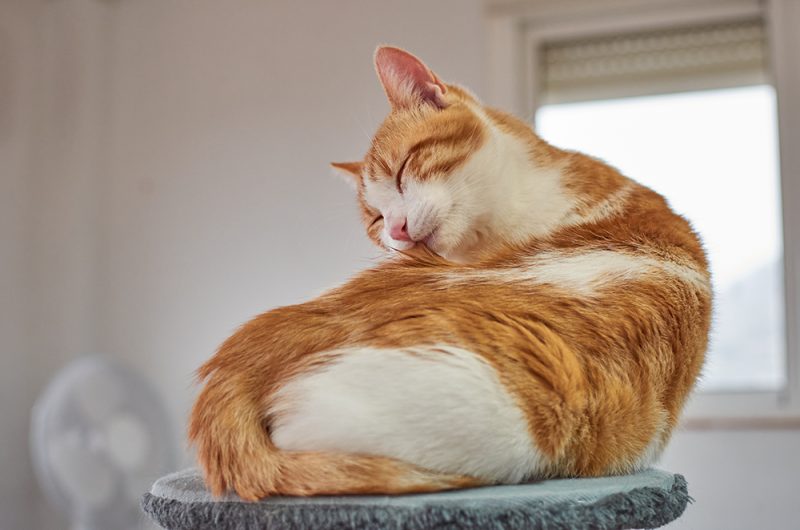
7. Pyoderma
Pyoderma is a condition that involves puss buildup in the skin. The illness may result from various health conditions, including infections, allergies, and cancers. Luckily, it is not a common condition in cats, but any of the previously mentioned causes, such as allergies and skin parasites, through itching, licking, and self-trauma, may lead to pyoderma if left untreated. But if it does develop, it typically results in bacterial overgrowth on the skin and signs of scratching.
Hair loss and scaling, crusts, sores, bumps, and draining wounds on the back and the base of the tail are other signs of pyoderma to watch out for.
- Veterinary attention is necessary to treat the onset of pyoderma in cats. A simple visit to your veterinarian’s office will provide you with an official diagnosis, and your vet will clip and clean the affected areas on the skin and prescribe appropriate antibiotics based on culture testing. Signs of scratching should start to dissipate within a few days.

Conclusion
There are many reasons that your cat might be scratching. It is essential to schedule a checkup with your veterinarian as soon as possible so you can get to the bottom of the problem once and for all. Your vet will prescribe your cat the appropriate and prompt treatment based on their diagnosis so they can finally feel better and their skin can recover.
You should speak to your vet before considering home remedies that have not been proven to work in cats, as they may worsen their skin issue and delay getting the treatment they need.
- Related Read: How to Stop Your Cat Scratching the Sofa?
Featured Image Credit: Susan Santa Maria, Shutterstock




